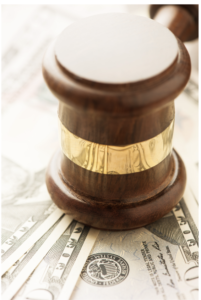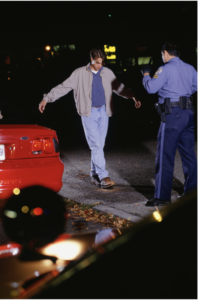
Driving while under the influence is one of if not the most commonly charged crime in the state of Georgia. Law enforcement officers at every level are trained on how to identify impaired driving patterns and take hours of classes on how to spot physical indicators of intoxication. DUI investigations often take twenty to thirty minutes and could result in you losing your ability to drive for the next 12 months. Georgia’s DUI laws are complicated and misreading even one detail could derail the next year of your life. Hire Adam and his team so you can focus on your daily stresses while we protect your license and future.
O.C.G.A. §40-6-391 contains the many ways that you can be charged with DUI in the state of Georgia.
A person shall not drive or be in actual physical control of any moving vehicle while:
- Under the influence of alcohol to the extent that it is less safe for the person to drive;
- Under the influence of any drug to the extent that it is less safe for the person to drive;
- Under the intentional influence of any glue, aerosol, or other toxic vapor to the extent that it is less safe for the person to drive;
- Under the combined influence of any two or more of the substances specified in paragraphs (1) through (3) of this subsection to the extent that it is less safe for the person to drive;
- The person’s alcohol concentration is 0.08 grams or more at any time within three hours after such driving or being in actual physical control from alcohol consumed before such driving or being in actual physical control ended; or
- Subject to the provisions of subsection (b) of this Code section, there is any amount of marijuana or a controlled substance, as defined in Code Section 16-13-21, present in the person’s blood or urine, or both, including the metabolites and derivatives of each or both without regard to whether or not any alcohol is present in the person’s breath or blood.
Punishments
The legal fallout from a DUI will depend on whether or not you have previously been convicted of a DUI. O.C.G.A. 40-6-391(c)(1-5) is a massive statute that explains all the complications you could face if found guilty.
(c) Every person convicted of violating this Code section shall, upon a first or second conviction thereof, be guilty of a misdemeanor, upon a third conviction thereof, be guilty of a high and aggravated misdemeanor, and upon a fourth or subsequent conviction thereof, be guilty of a felony except as otherwise provided in paragraph (4) of this subsection and shall be punished as follows:
(1) First conviction with no conviction of and no plea of nolo contendere accepted to a charge of violating this Code section within the previous ten years, as measured from the dates of previous arrests for which convictions were obtained or pleas of nolo contendere were accepted to the date of the current arrest for which a conviction is obtained or a plea of nolo contendere is accepted:
(A) A fine of not less than $300.00 and not more than $1,000.00, which fine shall not, except as provided in subsection (g) of this Code section, be subject to suspension, stay, or probation;
subsection (g) of this Code section, be subject to suspension, stay, or probation;
(B) A period of imprisonment of not fewer than ten days nor more than 12 months, which period of imprisonment may, at the sole discretion of the judge, be suspended, stayed, or probated, except that if the offender’s alcohol concentration at the time of the offense was 0.08 grams or more, the judge may suspend, stay, or probate all but 24 hours of any term of imprisonment imposed under this subparagraph;
(C) Not fewer than 40 hours of community service, except that for a conviction for violation of subsection (k) of this Code section where the person’s alcohol concentration at the time of the offense was less than 0.08 grams, the period of community service shall be not fewer than 20 hours;
(D) Completion of a DUI Alcohol or Drug Use Risk Reduction Program within 120 days following his or her conviction; provided, however, that if the defendant is incarcerated and such program cannot be completed within 120 days, it shall be completed within 90 days of his or her release from custody. The sponsor of any such program shall provide written notice of the Department of Driver Services’ certification of the program to the person upon enrollment in the program;
(E) A clinical evaluation as defined in Code Section 40-5-1 and, if recommended as a part of such evaluation, completion of a substance abuse treatment program as defined in Code Section 40-5-1; provided, however, that in the court’s discretion such evaluation may be waived; and
(F) If the person is sentenced to a period of imprisonment for fewer than 12 months, a period of probation of 12 months less any days during which the person is actually incarcerated;
(2) For the second conviction within a ten-year period of time, as measured from the dates of previous arrests for which convictions were obtained or pleas of nolo contendere were accepted to the date of the current arrest for which a conviction is obtained or a plea of nolo contendere is accepted:
(A) A fine of not less than $600.00 and not more than $1,000.00, which fine shall not, except as provided in subsection (g) of this Code section, be subject to suspension, stay, or probation;
(B) A period of imprisonment of not fewer than 90 days and not more than 12 months. The judge shall probate at least a portion of such term of imprisonment, in accordance with subparagraph (F) of this paragraph, thereby subjecting the offender to the provisions of Article 7 of Chapter 8 of Title 42 and to such other terms and conditions as the judge may impose; provided, however, that the offender shall be required to serve not fewer than 72 hours of actual incarceration;
(C) Not fewer than 30 days of community service; 
(D) Completion of a DUI Alcohol or Drug Use Risk Reduction Program within 120 days following his or her conviction; provided, however, that if the defendant is incarcerated and such program cannot be completed within 120 days, it shall be completed within 90 days of his or her release from custody. The sponsor of any such program shall provide written notice of the Department of Driver Services’ certification of the program to the person upon enrollment in the program;
(E) A clinical evaluation as defined in Code Section 40-5-1 and, if recommended as a part of such evaluation, completion of a substance abuse treatment program as defined in Code Section 40-5-1; and
(F) A period of probation of 12 months less any days during which the person is actually incarcerated;
(3) For the third conviction within a ten-year period of time, as measured from the dates of previous arrests for which convictions were obtained or pleas of nolo contendere were accepted to the date of the current arrest for which a conviction is obtained or a plea of nolo contendere is accepted:
(A) A fine of not less than $1,000.00 and not more than $5,000.00, which fine shall not, except as provided in subsection (g) of this Code section, be subject to suspension, stay, or probation; (B) A mandatory period of imprisonment of not fewer than 120 days and not more than 12 months. The judge shall probate at least a portion of such term of imprisonment, in accordance with subparagraph (F) of this paragraph, thereby subjecting the offender to the provisions of Article 7 of Chapter 8 of Title 42 and to such other terms and conditions as the judge may impose; provided, however, that the offender shall be required to serve not fewer than 15 days of actual incarceration;
(B) A mandatory period of imprisonment of not fewer than 120 days and not more than 12 months. The judge shall probate at least a portion of such term of imprisonment, in accordance with subparagraph (F) of this paragraph, thereby subjecting the offender to the provisions of Article 7 of Chapter 8 of Title 42 and to such other terms and conditions as the judge may impose; provided, however, that the offender shall be required to serve not fewer than 15 days of actual incarceration;
(C) Not fewer than 30 days of community service;
(D) Completion of a DUI Alcohol or Drug Use Risk Reduction Program within 120 days following his or her conviction; provided, however, that if the defendant is incarcerated and such program cannot be completed within 120 days, it shall be completed within 90 days of his or her release from custody. The sponsor of any such program shall provide written notice of the Department of Driver Services’ certification of the program to the person upon enrollment in the program;
(E) A clinical evaluation as defined in Code Section 40-5-1 and, if recommended as a part of such evaluation, completion of a substance abuse treatment program as defined in Code Section 40-5-1; and
(F) A period of probation of 12 months less any days during which the person is actually incarcerated;
(4) For the fourth or subsequent conviction within a ten-year period of time, as measured from the dates of previous arrests for which convictions were obtained or pleas of nolo contendere were accepted to the date of the current arrest for which a conviction is obtained or a plea of nolo contendere is accepted:
(A) A fine of not less than $1,000.00 and not more than $5,000.00, which fine shall not, except as provided in subsection (g) of this Code section, be subject to suspension, stay, or probation;
(B) A period of imprisonment of not less than one year and not more than five years; provided, however, that the judge may suspend, stay, or probate all but 90 days of any term of imprisonment imposed under this paragraph. The judge shall probate at least a portion of such term of imprisonment, in accordance with subparagraph (F) of this paragraph, thereby subjecting the offender to the provisions of Article 7 of Chapter 8 of Title 42 and to such other terms and conditions as the judge may impose;
(C) Not fewer than 60 days of community service; provided, however, that if a defendant is sentenced to serve three years of actual imprisonment, the judge may suspend the community service;
(D) Completion of a DUI Alcohol or Drug Use Risk Reduction Program within 120 days following his or her conviction; provided, however, that if the defendant is incarcerated and such program cannot be completed within 120 days, it shall be completed within 90 days of his or her release from custody. The sponsor of any such program shall provide written notice of the Department of Driver Services’ certification of the program to the person upon enrollment in the program;
(E) A clinical evaluation as defined in Code Section 40-5-1 and, if recommended as a part of such evaluation, completion of a substance abuse treatment program as defined in Code Section 40-5-1; and
(F) A period of probation of five years less any days during which the person is actually imprisoned; provided, however, that if the ten-year period of time as measured in this paragraph commenced prior to July 1, 2008, then such fourth or subsequent conviction shall be a misdemeanor of a high and aggravated nature and punished as provided in paragraph (3) of this subsection;
DUI Refusals
30 Day Letter
When you get arrested for DUI in Georgia there is an automatic process that starts and could result in your license being suspended for 12 months. The officer at the scene will give you a temporary license that is good for  the next 45 days. There are very tight deadlines with how to deal with this issue. Within 30 days of your arrest, you will need to submit a letter of appeal to the Georgia Department of Driver Services. This will set you down for an Administrative License Hearing, which our team handles routinely. If you do not send this letter within 30 days, your license will be suspended once the temporary license expires. Let us keep track of these letters and deadlines on your behalf so you can focus on your family.
the next 45 days. There are very tight deadlines with how to deal with this issue. Within 30 days of your arrest, you will need to submit a letter of appeal to the Georgia Department of Driver Services. This will set you down for an Administrative License Hearing, which our team handles routinely. If you do not send this letter within 30 days, your license will be suspended once the temporary license expires. Let us keep track of these letters and deadlines on your behalf so you can focus on your family.
At this hearing, O.C.G.A. 40-5-67.1(2) requires the officer to show the following:
(A)(i) Whether the law enforcement officer had reasonable grounds to believe the person was driving or in actual physical control of a moving motor vehicle while under the influence of alcohol or a controlled substance and was lawfully placed under arrest for violating O.C.G.A. §40-6-391; or
(ii) Whether the person was involved in a motor vehicle accident or collision resulting in serious injury or fatality; and
(B) Whether at the time of the request for the test or tests the officer informed the person of the person’s implied consent rights and the consequence of submitting or refusing to submit to such test; and
(C)(i) Whether the person refused the test; or
(ii) Whether a test or tests were administered and the results indicated an alcohol concentration of .08 grams or more or, for a person under the age of 21, an alcohol concentration of .02 grams or more or, for a person operating or having actual physical control of a commercial motor vehicle, an alcohol concentration of .04 grams or more, and
(D) Whether the test or tests were properly administered by an individual possessing a valid permit issued by the Division of Forensic Sciences of the Georgia Bureau of Investigation on an instrument approved by the Division of Forensic Services or a test conducted by the Division on Forensic Services, including whether the machine at the time of the test was operated with all its electronic and operating components prescribed by its manufacturer properly attached and in good working order, which shall be required. A copy of the operator’s permit showing that the operator has been trained on the particular type of instrument used and one of the original copies of the test results or, where the test is performed by the Division of Forensic Sciences, a copy of the crime lab report shall satisfy the requirements of this subparagraph.
Do I need an attorney for my Hearing?
Absolutely! An attorney will keep the deadlines and details straight and keep you informed while you focus on the daily necessities of your life. Our attorneys will review your reports and find holes in the officer’s case that you cannot recognize yourself.
Implied Consent
When you are arrested for DUI, the arresting officer will ask you to consent to the testing of a bodily substance (blood, breath, or urine) in order to gather evidence of your suspected impairment. Before doing this, the officer is required to read a long speech known as the “Implied Consent Warning”. The warning an officer reads will differ slightly depending on if you are above 21 years old, below 21 years old, or if you are driving a commercial motor vehicle.
O.C.G.A. 40-5-67.1(b)(1) – Suspects under 21 years old
“The State of Georgia has conditioned your privilege to drive upon the highways of this state upon your submission to state administered chemical tests of your blood, breath, urine, or other bodily substances for the purpose of determining if you are under the influence of alcohol or drugs. If you refuse this testing, your Georgia driver’s license or privilege to drive on the highways of this state will be suspended for a minimum period of one year. Your refusal to submit to blood or urine testing may be offered into evidence against you at trial. If you submit to testing and the results indicate an alcohol concentration of 0.02 grams or more, your Georgia driver’s license or privilege to drive on the highways of this state may be suspended for a minimum period of one year. After first submitting to the requested state tests, you are entitled to additional chemical tests of your blood, breath, urine, or other bodily substances at your own expense and from qualified personnel of your own choosing. Will you submit to the state administered chemical tests of your (designate which test)?”
O.C.G.A. 40-5-67.1(b)(2) – Suspects over 21 years old
“The State of Georgia has conditioned your privilege to drive upon the highways of this state upon your submission to state administered chemical tests of your blood, breath, urine, or other bodily substances for the purpose of determining if you are under the influence of alcohol or drugs. If you refuse this testing, your Georgia driver’s license or privilege to drive on the highways of this state will be suspended for a minimum period of one year. Your refusal to submit to blood or urine testing may be offered into evidence against you at trial. If you submit to testing and the results indicate an alcohol concentration of 0.08 grams or more, your Georgia driver’s license or privilege to drive on the highways of this state may be suspended for a minimum period of one year. After first submitting to the requested state tests, you are entitled to additional chemical tests of your blood, breath, urine, or other bodily substances at your own expense and from qualified personnel of your own choosing. Will you submit to the state administered chemical tests of your (designate which test)?”
O.C.G.A. 40-5-67.1(b)(3) – Commercial Motor Vehicles
“The State of Georgia has conditioned your privilege to drive upon the highways of this state upon your submission to state administered chemical tests of your blood, breath, urine, or other bodily substances for the purpose of determining if you are under the influence of alcohol or drugs. If you refuse this testing, you will be disqualified from operating a commercial motor vehicle for a minimum period of one year. Your refusal to submit to blood or urine testing may be offered into evidence against you at trial. If you submit to testing and the results indicate the presence of any alcohol, you will be issued an out-of-service order and will be prohibited from operating a commercial motor vehicle for 24 hours. If the results indicate an alcohol concentration of 0.04 grams or more, you will be disqualified from operating a commercial motor vehicle for a minimum period of one year. After first submitting to the requested state tests, you are entitled to additional chemical tests of your blood, breath, urine, or other bodily substances at your own expense and from qualified personnel of your own choosing. Will you submit to the state administered chemical tests of your (designate which test)?”
There are many ways officers can improperly read these warnings. Our attorneys have reviewed thousands of body cams and may notice faults in the officer’s warning that can result in the dismissal or reduction of your charges. Hire us and let our experienced eyes and ears look over your case to ensure every stone is unturned and every defense is explored.
Standardized Field Sobriety Tests
Law enforcement officers go through classes to administer a variety of tests designed to discern if your motor and mental abilities are impaired. These tests are completely voluntary because they require your active participation to help the officer in his investigation. Recent court decisions in Georgia state that you can refuse to participate and that your refusal cannot be used against you as evidence of impairment. The most common Field Sobriety Tests are as follows:
HGN – Horizontal Gaze Nystagmus
- This is a test involving your eyes. The officer will be looking for how your eyes move as they follow a small object. When a person is under the influence of alcohol their eyes will jerk involuntarily when tracking an object. Before you start this test, the officer will make an initial check of your eyes and ask if there are any medical conditions or injuries you’ve had with respect to your eyes.

- Officers will turn you away from any lights or the road and hold a pen or small light 12-15 inches away from you and at your eye level. The officer will then slowly move the object and ask you to follow with your eyes and eyes only. There are 3 clues of impairment the officer is looking for in each eye, making a total of six possible clues. The more clues seen, the more likely the officer will find probable cause to arrest you.
- Participating in this test is completely voluntary.
Walk and Turn
- When someone is intoxicated, their balance is one of the aspects that can be affected. This test will get to the heart of that issue by asking you to walk in a straight line, turn around in a specific way, and walk back to where you started. Before starting this test the officer will ask you if there are any injuries you may have that affect your balance.
 This test is divided into two parts: Instruction and Performance. During the instruction phase, the officer will explain that you will take nine steps forward placing the heel of your foot right in front of the toe of the previous foot. You will do this for nine steps. At the end of those nine steps you must perform a pivot where you keep one foot on the ground and take a series of small steps with the other foot until you turn around. After the turn, you must perform nine more steps and return to the starting point of the test. During this test you are often asked to count out loud as you take each step and you must keep your arms to your sides for the entire duration.
This test is divided into two parts: Instruction and Performance. During the instruction phase, the officer will explain that you will take nine steps forward placing the heel of your foot right in front of the toe of the previous foot. You will do this for nine steps. At the end of those nine steps you must perform a pivot where you keep one foot on the ground and take a series of small steps with the other foot until you turn around. After the turn, you must perform nine more steps and return to the starting point of the test. During this test you are often asked to count out loud as you take each step and you must keep your arms to your sides for the entire duration.- After all the directions are explained and you state you are ready, you will be asked to perform the test as accurately as possible. The officer will be watching for clues of intoxication including but not limited to your balance during the instruction phase, any stopping during the test, failing to step heel-to-toe, or using your arms to balance during the steps. Again, the more of these clues the officer sees the more likely the officer will find probable cause to arrest for DUI.
- Participating in this test is completely voluntary.
One Leg Stand
- This test is centered around testing your balance. The officer should begin this test by asking if there are any medical conditions or injuries that you have that could stain the results of the test. For this test, the officers will provide instructions and give a demonstration. The instructions will be to raise one leg approximately six inches off the ground. While keeping the raised foot parallel with the ground and your arms down your sides, you will count until instructed to stop. During this entire test you must look at the foot raised off the ground.
- There are a variety of clues that the officer will be looking for during the performance of this test. The officer will be keeping track of any swaying during the test, using your arms for balance, or having to drop your raised foot before instructed to do so.
- Participating in this test is completely voluntary.
Again, these tests are voluntary and if you refuse to participate in them, that refusal cannot be used against you as evidence in court. If you do participate in these tests and the officer gives improper instructions or otherwise goes against protocol, this could change the outcome of your case. Whatever the result of your tests, you can and should challenge them. Our seasoned attorneys can identify these issues along with all the other mistakes an officer might make in your case. Your rights are best protected with Adam in your corner.
